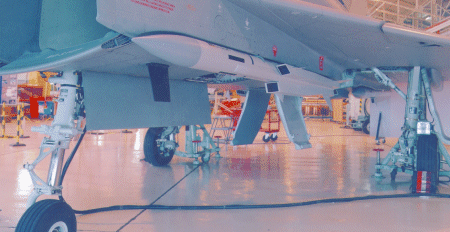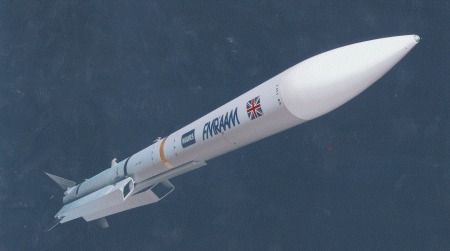Stewart Penney/PARIS

With the long-running UK Airborne Stand-Off Radar (ASTOR) competition settled during the Paris air show, industry's attention turned towards the same nation's beyond visual range air-to-air missile (BVRAAM) competition. The outcome could dramatically affect the world's long-range missile market and make or break the Eurofighter Typhoon's export prospects.
BVRAAM is a battle between a Raytheon-led team offering derivatives of its AIM-120 Advanced Medium Range Air-to-Air Missile (AMRAAM) and a Matra BAe Dynamics-led group offering the all-new Meteor.
The BVRAAM requirement is for a long-range missile with a no-escape zone several times larger than that of today's missiles. In-service date is 2008, while the bidders describe the contract value as between £750 million ($1.2 billion) and £1 billion. Range and manoeuvrability criteria require a ramjet, although arocket motor will be needed for launch and acceleration to ramjet operating speed.
ASTOR-winner Raytheon offers a staged approach that introduces elements of the ramjet-powered Future Medium Range Air-to-Air Missile (FMRAAM) to weapons that could enter service sooner than a BVRAAM winner.

The AIM-120+, using the FMRAAM seeker and guidance section, combined with AMRAAM's propulsion section, would be followed by the Extended Range Air-to-Air Missile (ERAAM), combining the same seeker section with a dual-pulse rocket motor to boost range. Andy Head, Raytheon Systems' director of marketing, says ERAAM has 80% of FMRAAM's kinematic performance at 50% of the cost. He says the ERAAM/ FMRAAM combination fits within the UK budget.
Meteor would be developed by Eurofighter partner nations - Germany, Italy, Spain and the UK, plus Sweden, which is keen to export the Saab/British Aerospace Gripen. If the UK selects Meteor, France will join the programme - a major boost for the five nations. France requires a missile with a range greater than that of the Matra BAe Dynamics Mica and, significantly, has signalled its intent to accept the unsigned memorandum of understanding agreed by the five original partners.
Team Meteor is offering a single missile for the BVRAAM requirement. Matra BAe Dynamics Meteor programme head Peter Richardson says potential threats - such as a ramjet version of the AA-12/R-77 displayed at Paris by Russia's Vympel, if it goes into production - require the full capability.
Overshadowing technical issues is the potential impact on industry rationalisation and the USA's ability to block Eurofighter exports. Team Meteor - Matra BAe Dynamics, Alenia Marconi Systems, Casa, DaimlerChrysler Aerospace's (Dasa) LFK and Saab - argues that it will be difficult to maintain a European missile capability if Meteor is unsuccessful. Raytheon counters that design authority for its AMRAAM developments will be transferred to the UK and that Europe will have an opportunity to share in the programme.
US defence secretary William Cohen and the US State Department have tried to ease exportability concerns, although Congress could still stop Eurofighter sales if AMRAAM or its derivatives are included in the package. Eurofighter managing director Brian Phillipson argues that the only way to ensure that exports cannot be blocked is to offer Typhoon with both missiles. An embargo is unlikely on a Eurofighter sale with US missiles if the customer can simply change to a European weapon.
Kick starting consolidation
A Meteor win could kick-start European missile consolidation, which programmes such as the Trigat anti-tank missile and the naval Principal Anti-Air Missile System (PAAMS) have failed to achieve. The merger of Matra and Aerospatiale has rolled the latter's missile business into Matra BAe Dynamics. Meanwhile BAe's takeover of Marconi Electronic Systems opens the possibility of a merger between the two principal players - Matra BAe Dynamics and Alenia Marconi Systems. Saab is already 35% owned by BAe while the UK giant also owns 30% of LFK. The last Team Meteor member, Casa, is merging with Dasa.
A Raytheon win could mean greater co-operation between the UK and USA in missile development, says Raytheon Missile Systems vice-president Jerry Lockhard. He believes that the US Air Force will buy ERAAM/FMRAAM if selected by the UK and will also seek a deal to leverage technology between the two nations' missile programmes beyond 2010.
Source: Flight International




















